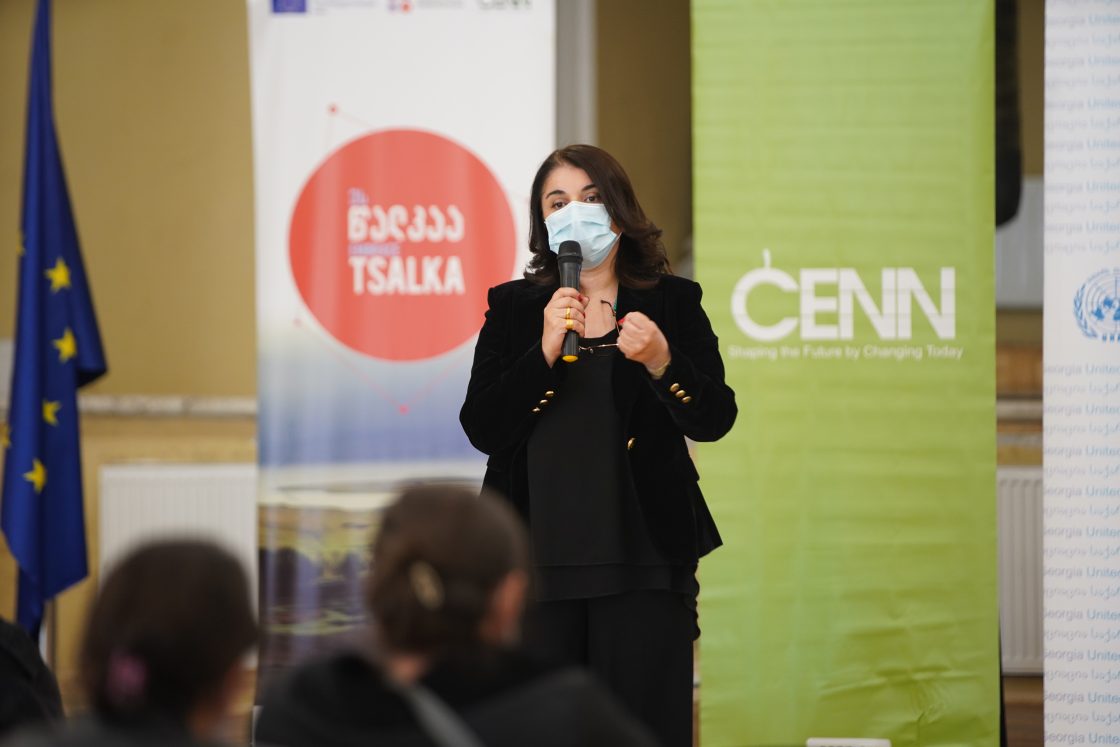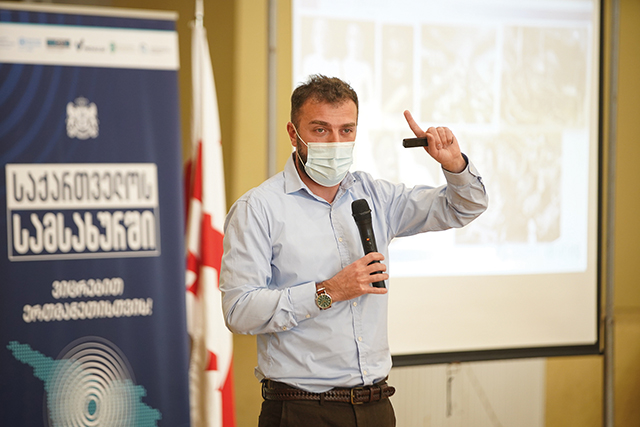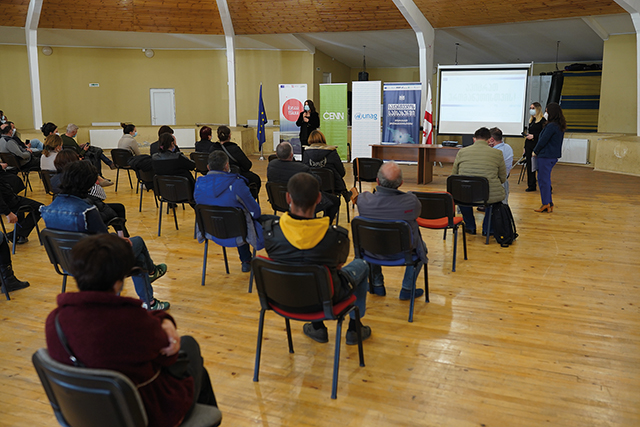EU Supported Tsalka Local Action Group Joins COVID-19 Vaccination Campaign
05.November.2021
Last weekend, the EU-supported Tsalka Local Action Group (LAG) hosted one of many countrywide information meetings concerning Covid-19 vaccination and immunization. The meeting was supported by the European Union and World Health Organization (WHO) in cooperation with the United Nations Association of Georgia CENN, the Tsalka LAG, and the National Center for Disease Control and Public Health (NCDC). The purpose of the meeting was to raise public awareness about vaccination against COVID-19 and to popularize the importance of vaccination in the fight against the pandemic.
The meeting was chaired by invited experts and specialists in the field of medicine, who provided the participants with comprehensive information on public health and the importance of vaccination.
“The meetings made it clear that people need credible information to make an informed decision to get vaccinated against the coronavirus,” said Tamta Khutsishvili, UN Association Project Manager. “To this end, the UN Association’s information campaign is holding meetings with the most vulnerable groups, including those living in remote villages, residents, and settlements along the occupation line, as well as ethnic minorities.”
About 100 residents from various villages of Tsalka municipality attended the meeting. The Tsalka Local Action Group itself mobilized the populations from eight villages. The meeting was held in an interactive manner, and all participants had a chance to ask questions and get comprehensive answers about the vaccination. The most commonly heard questions were Why is pandemic a problem? What is vaccination? Is vaccination safe?
Zurab Alkhanishvili, an expert who spoke about vaccination at the meeting, said the disinformation campaign against vaccination in general, and against Covid-19 vaccines in particular, is quite strong.
“The situation in which humanity found itself at the onset of the pandemic was unfamiliar to us,” he noted. “Fear, anxiety, and stress have increased the demand for information. It is difficult to distinguish between true and false news in the sea of information. This is why it is important to communicate directly with people so that you can understand what is bothering them, what is scaring them, what is hindering them; listen to their questions, and provide accurate, evidence-based, verified information. In fact, no-one wants to harm themselves or those around them, they just have incorrect or insufficient information about both Covid-19 and vaccination.”
He said meetings similar to those held in Tsakla are very productive and added that the population had very practical questions and the audience was active.
“They have tools to test the results, however, the quality of the audience activity and the content of the discussion already testified to the fact that these people would have made the decision in favor of vaccination anyway.”
GEORGIA TODAY sat down with Zurab Alkhanishvili to learn more about the importance of proper communication and the vital role of vaccines in defeating pandemics.

“In public health crisis situations, our weapon is communication,” he tells us. “This is called risk communication, which is a very accurate and extremely important discipline. Each word, each action can significantly affect people’s mood and behavior. Vaccination is one of the tools to protect ourselves and those around us and to stop the pandemic. In our meetings, when we talk to the population, we rely on the above principles. We do not demand anything from anyone. It is up to them to decide. We provide them with information to make decisions that will be better for them, for those around them, and for the community as a whole.”
What types of activities do you plan to increase the number of people who want to be vaccinated?
Our activities involve direct communication with the population, as well as preparation and dissemination of communication materials through social networks. In addition, during every meeting, we look for interesting, active people in the same community, and we empower them. Eventually, these people become sort of “health ambassadors” in their regions.
Vaccines, in a way, are victims of their own success today. We no longer see past killers of pox, measles, polio, etc. around us, and as a result, we have relaxed our attention to communicable diseases, so much so that we do not see it as a merit of vaccines. And, unfortunately, we have been talking too little about it in recent years. However, every citizen should be aware of the enormous benefits and good that vaccination brings, alongside the potential risks and side effects that accompany this process.
“Youth are vital to the awareness-raising process. Young people are a part of society that has a huge potential for volunteering,” he tells us. “This is the energy that can bring about the greatest change. Their role in pandemic management can also be immeasurable.”
He noted that after the briefings, mobile teams are available to vaccinate on the spot if there is no immunization room at the local outpatient clinic in the community.
Information meetings are being held in five regions of the country by the UN Association in cooperation with the NCDC, and with the financial support of the European Union and the World Health Organization.
The organization of meetings in Tsalka Municipality was supported by CENN and the LAG.
Nana Janashia, Executive Director of CENN told us that from the day the Covid-19 vaccines became available in the country, CENN has been promoting the importance of vaccination among its colleagues, project beneficiaries, and partners. Within this period, they have organized several webinars about vaccination and encouraged youth and teachers to participate in it.
“Since the vaccination process is going slowly in Georgia, and the vaccine is the only way that can help us to win over this global pandemic, we plan to organize such campaigns and involve professionals in this process so that the provision of information on this issue becomes the responsibility of the relevant specialists,” she adds.
GEORGIA TODAY spoke with her further on the importance of promoting vaccination.

What is the best way to convince the population of the need for vaccination?
Today, we have two main issues: a lack of information and a huge amount of disinformation about Covid-19 vaccination. People lack accurate and reliable information about the vaccination process and sometimes become victims of organized disinformation spread on the internet. The result is that too many people refuse to be vaccinated. The only way to increase the vaccination rate is to provide accurate, reliable information regularly, and this information should be provided by relevant individuals, both professionals and those whom the public trusts. It is also important to provide accurate statistical information on the prevalence of diseases in the vaccinated and unvaccinated segments.
What message is the CENN team sending to promote the vaccine?
Protect others by protecting yourself – get vaccinated. At CENN, we believe that to protect our families, friends, colleagues, and loved ones, we need to protect ourselves, and vaccination is the best way to do so.
What was the significance of the event held in Tsalka municipality and what result do you think it will bring?
About 100 residents from various villages of Tsalka municipality attended the meeting, and up to 60% of them were not vaccinated. The meeting participants were very engaged and full of questions. It was very important that the meeting was attended by teachers and local youth. At the end of the meeting, many participants expressed their readiness to get vaccinated and promote vaccination among their communities as well. We hope this campaign will have a positive impact and will increase the vaccination process. We will follow this process and organize additional campaigns as needed.
How important is it to involve organizations like CENN in promoting vaccination?
“CENN implements many different projects in almost every region of Georgia,” Janashia tells us. “Each project has many beneficiaries and target groups who trust the organization and support its initiatives. The involvement of CENN and other organizations in promoting vaccination is very important because many people believe in our mission, vision, goals, and values, and they trust the information we share with them. At CENN, we believe that each of us should contribute to the process and promote the vaccination process among our communities to end this pandemic and get back to normal life as soon as possible.
“Every organization in its segment should try to promote vaccination as much as possible, because it is necessary to defeat the pandemic and take active steps to restore the normal rhythm of life.”
The informational meeting was held within the framework of a large-scale information campaign which is being implemented within the framework of the UN Association project in the villages of five regions of Georgia – Kakheti, Samegrelo, Kvemo Kartli, Adjara, and Imereti.
By Ketevan Skhirtladze
Georgia Today






